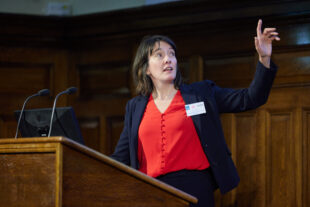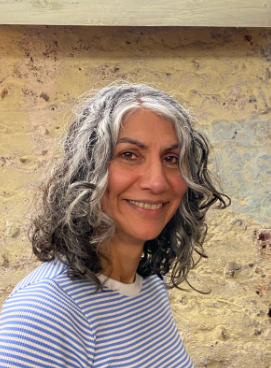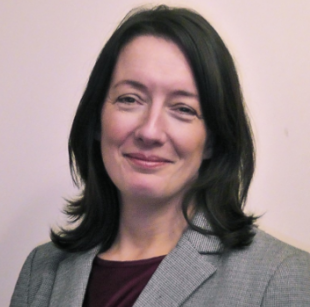
Image: Dr Jo Jolly, Deputy Director - Head of Project Futures, Infrastructure and Projects Authority, Cabinet Office (Photo credit: Ollie Rudkin)
This year’s International Women’s Day theme was #inspireinclusion, so we spoke with some of the Infrastructure and Project Authority’s leading women in project delivery to understand why diversity and representation is so important when building our future public services.
Dr Jo Jolly, Samina Khan and Alison Baptiste, share their stories of working in a typically male-dominated infrastructure sector, including in the areas of engineering, construction and the built/natural environment.
These women are paving the way for modernisation, innovation and diversity in the future of our UK infrastructure - from railways, roads, schools, hospitals and housing, to energy, telecommunications, defence, IT and major transformation programmes. Ultimately, these become the railways that take us to work, the hospitals that provide critical care and the schools our children learn in.
Why is it important to have women making the decisions and leading the vision in male-dominated industries such as infrastructure and construction?

Samina Khan, IPA Deputy Director Project Delivery - DESNZ, FCDO & DBT: Imagine a place where infrastructure is ‘designed for women by women’ - wouldn’t that be a great thing! So much of our infrastructure is designed and constructed without understanding and considering the needs of the different users, including women. If we are striving for better outcomes, we need to make sure we have diversity and representation across all levels, including senior levels. This is about unlocking talent for the purpose of better outcomes.
 Alison Baptiste CBE, IPA Director Public & Security Services: Women bring different perspectives to men - not better, not worse, but different and that difference is key. The best pieces of public infrastructure are inspiring and meet not just the practical needs but the social, environmental and aesthetic too - they make people want to use them and people enjoy using them.
Alison Baptiste CBE, IPA Director Public & Security Services: Women bring different perspectives to men - not better, not worse, but different and that difference is key. The best pieces of public infrastructure are inspiring and meet not just the practical needs but the social, environmental and aesthetic too - they make people want to use them and people enjoy using them.
Too often infrastructure and construction simply does the basic requirement and misses the opportunity to make it really inspiring. Diverse thinking, and input and challenge to the vision and decision-making is what is required. That is diversity in all its forms.
Gender is often cited in the infrastructure and construction space as it's traditionally been very male dominated, but it's all the wider diverse views that are important.
 Dr Jo Jolly, Deputy Director - IPA Head of Project Futures: It's essential to have diversity of thought in making good decisions and leading a meaningful vision. This includes gender, ethnicity, age, social and neurodiversity, to name just a few of the voices we need to be hearing. We should be providing a psychologically safe environment where people can speak up, without fear of the consequences, and know that their viewpoint will be heard.
Dr Jo Jolly, Deputy Director - IPA Head of Project Futures: It's essential to have diversity of thought in making good decisions and leading a meaningful vision. This includes gender, ethnicity, age, social and neurodiversity, to name just a few of the voices we need to be hearing. We should be providing a psychologically safe environment where people can speak up, without fear of the consequences, and know that their viewpoint will be heard.
The Association for Project Management (APM) funded research into how our ethics influence projects, and it is a profoundly insightful and sobering to read. Dr Efrosyni Konstantinou describes how a leader's ethics dominate strategic decisions, and also how they sit in a person's blind spot. So, self-awareness is key.
How do you think business can better get more women into infrastructure, engineering and construction etc?
Samina: That is a big question, and it probably requires a whole culture shift which promotes and proactively demonstrates zero tolerance for discrimination and harassment, with equality in pay and opportunities. Some other measures we can take:
- Look at what we are doing in schools to encourage girls into STEM subjects.
- Have good female role models that are relatable and different ages - and having better representation in senior positions.
- Understand why the UK lags behind so many other countries where the number of women going into these industries and staying in them is greater.
- Stop highlighting good maternity benefits and childcare vouchers as a perk - this should be the norm and an integral part of a package.
- Businesses should check their policies and make sure these are supportive of all.
- Consider how women are supported in achieving promotion and getting into leadership positions.
- Women need to feel safe and respected - one woman raising questions in a room filled with men requires courage!
Alison: In my experience our ideas of our future start very young. I've been in schools where teenagers have already ruled out careers in infrastructure, engineering and construction because of a variety of reasons; portrayal of the industry in the media, parental views etc. We need to focus on communicating widely how infrastructure can transform our daily lives for the better and how exciting it is to be part of that.
Jo: Create a more inclusive environment. It's not complex or difficult. It is a choice.
Why are women in leadership roles important in the driving forward of our ambition of net zero and sustainability in UK infrastructure-build?
Jo: Net zero and sustainability is itself a ‘grand challenge’, as described by Dr Efrosyni Konstantinou, where the lack of diversity of thought and representation is felt most acutely. The nature of climate change is that it is systemic, and regressive. That means that what happens in one part of the world, or particular system, can catastrophically impact somewhere else.
Dr Konstantinou states that even in advanced societies and economies, certain social groups (e.g. women, minorities and vulnerable communities) frequently do not have the same opportunities to bring forward their views and ultimately to act. As long as imbalances and exclusions exist, we will not properly understand the real issues and therefore we won't develop the solutions needed.
What has been your experience throughout your career being a woman in project delivery?
Samina: My experiences have been both positive and negative. Starting with my first job after graduating as a civil engineer in the private sector, where I regularly did a sweep of all the site cabins to remove the inappropriate calendars, to being told there was no point investing in my development, as I would ‘get married, have children and that would be the end of my career’.
I have benefitted from having great role models and champions who have helped shape, identify and build my strengths and successes, encouraging me to take the next step in my career.
Alison: I've had a great career - delivering infrastructure that has had transformational impacts on communities and it is so very rewarding. Generally once I've passed the test of 'does she know what she's doing?' then I've been treated with respect, and I've been encouraged and supported throughout my career.
I have received some inappropriate comments and actions throughout my career, but mainly at the start of it. There are still some remnants of that behaviour, but the industry is definitely much more inclusive and I have learned to challenge it more effectively.
What is the best piece of advice you have been given by another woman in the early stages of your career?
Samina: I have never had a senior role model, which is why I feel very strongly about mentoring the next generation - I put a lot of effort into this and regularly mentor 16-to-18-year-old women, encouraging them to continue in STEM and identifying workplace placements. I recently gave a presentation to 1st year civil engineering students at Brighton University, outlining my career and offering to mentor and coach.
While I had very few female engineering role models, I have a great group of female friends and we have all supported each other in different ways throughout our careers.
Alison: Believe in yourself and learn how to challenge constructively - never be afraid to do so.
Jo: My strongest influence in my sense and appreciation of gender equality is from my formative years, long before I started work. While I grew up in a traditional home, where dad went to work, fixed the car etc, and mum stayed at home, cooked, cleaned and fed us, I was never aware of male/female roles. I believe that's because of the regard and respect my parents had for each other as people. My sister and I were given the freedom to make our choices, were taught how to change spark plugs and do an oil change, and at no point did I feel I was identified by my gender.
What is the best part of your job? And can you describe a ‘pinch me’ moment?
Samina: I think great leadership is demonstrated by Cat Little, Head of the Government Finance Function and Second Permanent Secretary, who came and spoke at an IPA event - she talked about the importance of running for both her mental and physical wellbeing. This is important in order to thrive personally and professionally.
Alison: Seeing communities transformed by the work I have done - protecting communities from devastating flooding or providing clean drinking water has been so rewarding. Now I am privileged to work on some of the most technically demanding projects in the world e.g. nuclear submarines - they definitely have the 'wow' factor'.
My 'pinch me' moment was probably when I discovered I'd been nominated for a CBE for my work to protect communities from flooding - and then receiving it from King Charles.
Jo: My "pinch me" moment was when I met Helen Campbell, a former Infrastructure and Project Authority director, in applying for my current role. And working for her was the most fulfilling and rewarding year of my working life. People thrive in great leadership environments.
The project delivery profession in government leads some of the most innovative and complex projects in the world. The profession is growing year on year – there has never been a better time to join a community that values development and inclusivity. Does a role in project delivery appeal to you? Find out more through our civil service careers website: https://www.civil-service-careers.gov.uk/professions/working-in-project-management-and-delivery/
To learn more about the IPA, click here.
Recent Comments